This section introduces key papers in the DEA and Tourism. These papers have had a significant impact on the DEA and its application.
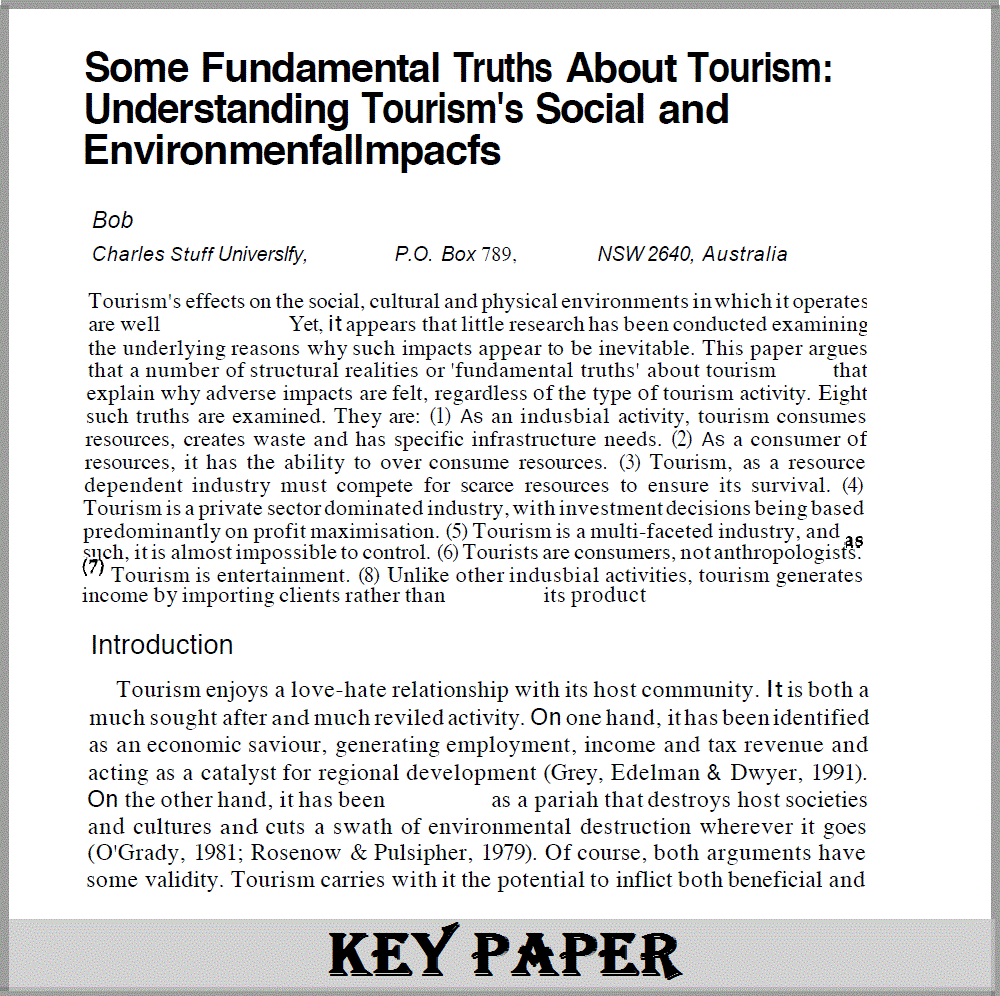
Some Fundamental Truths About Tourism: Understanding Tourism's Social and Environmental Impacts
Author: Bob
Journal: Journal of Sustainable Tourism
Published: 1993
Abstract: Tourism's effects on the social, cultural and physical environments in which it operates are well documented. Yet, it appears that little research has been conducted examining the underlying reasons why such impacts appear to be inevitable. This paper argues that a number of structural realities or 'fundamental truths' about tourism exist that explain why adverse impacts are felt, regardless of the type of tourism activity. Eight such truths are examined. They are: (1) As an industrial activity, tourism consumes resources, creates waste and has specific infrastructure needs. (2) As a consumer of resources, it has the ability to over consume resources. (3) Tourism, as a resource dependent industry must compete for scarce resources to ensure its survival. (4(Tourism is a private sector dominated industry,with investment decisions being based predominantly on profit maximization. (5) Tourism is a multi-faceted industry, and such, it is almost impossible to control. (6) Tourists are consumers, not anthropologists.(7) Tourism is entertainment. (8) Unlike other industrial activities, tourism generates income by importing clients rather than exporting its product.
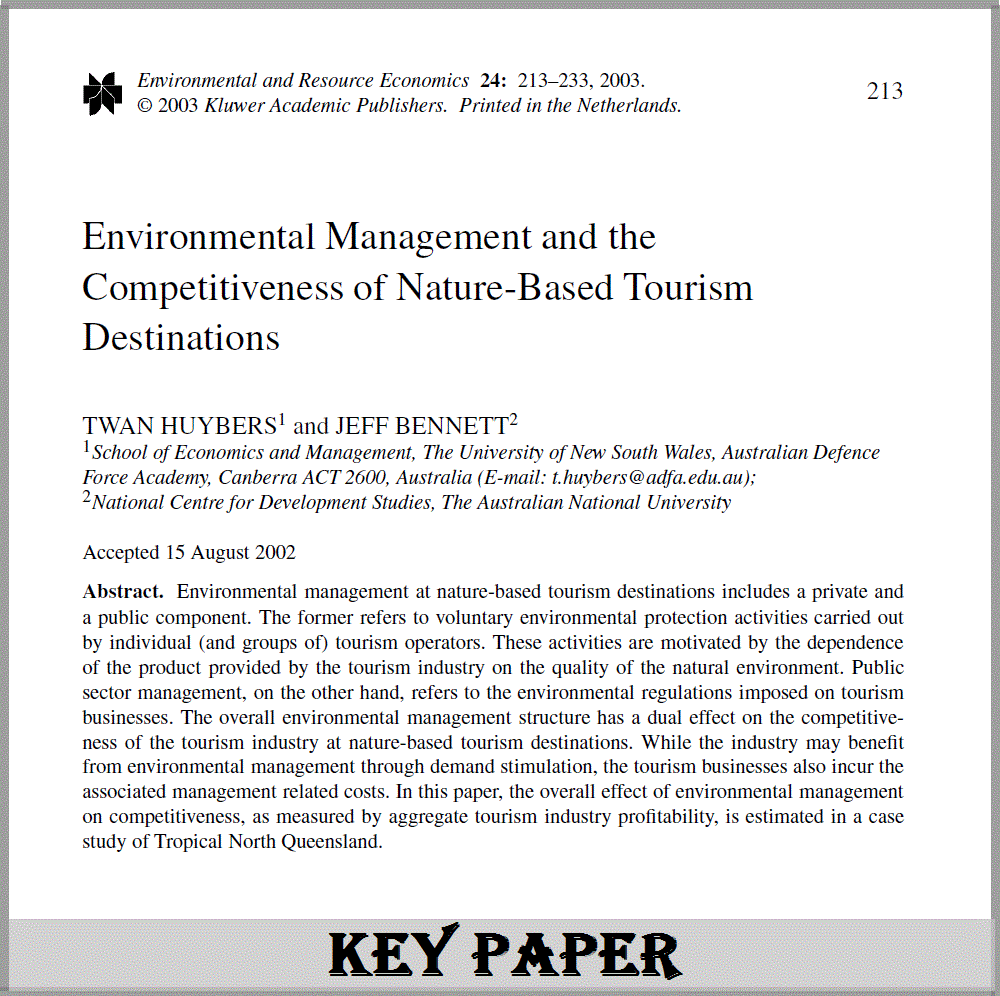
Environmental Management and the Competitiveness of Nature-Based Tourism Destinations
Authors: TWAN HUYBERS and JEFF BENNETT
Journal: Environmental and Resource Economics
Published: 2003
Abstract: Environmental management at nature-based tourism destinations includes a private and a public component. The former refers to voluntary environmental protection activities carried out by individual (and groups of) tourism operators. These activities are motivated by the dependence of the product provided by the tourism industry on the quality of the natural environment. Public sector management, on the other hand, refers to the environmental regulations imposed on tourism businesses. The overall environmental management structure has a dual effect on the competitiveness of the tourism industry at nature-based tourism destinations. While the industry may benefit from environmental management through demand stimulation, the tourism businesses also incur the associated management related costs. In this paper, the overall effect of environmental management on competitiveness, as measured by aggregate tourism industry profitability, is estimated in a case study of Tropical North Queensland.
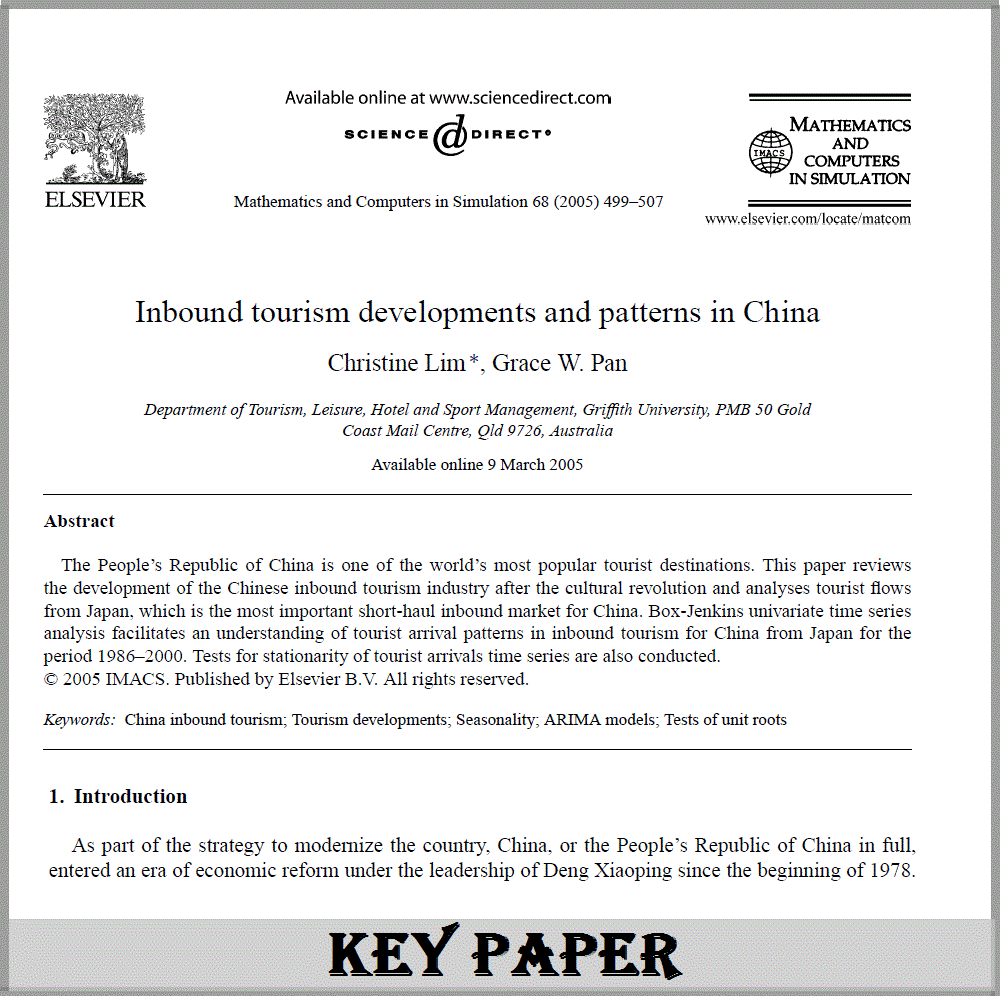
Inbound tourism developments and patterns in China
Authors: Christine Lim, Grace W. Pan
Journal: Mathematics and Computers in Simulation
Published: 2005
Abstract: The People’s Republic of China is one of the world’s most popular tourist destinations. This paper reviews the development of the Chinese inbound tourism industry after the cultural revolution and analyses tourist flow from Japan, which is the most important short-haul inbound market for China. Box-Jenkins univariate time series analysis facilitates an understanding of tourist arrival patterns in inbound tourism for China from Japan for the period 1986–2000. Tests for stationarity of tourist arrivals time series are also conducted.
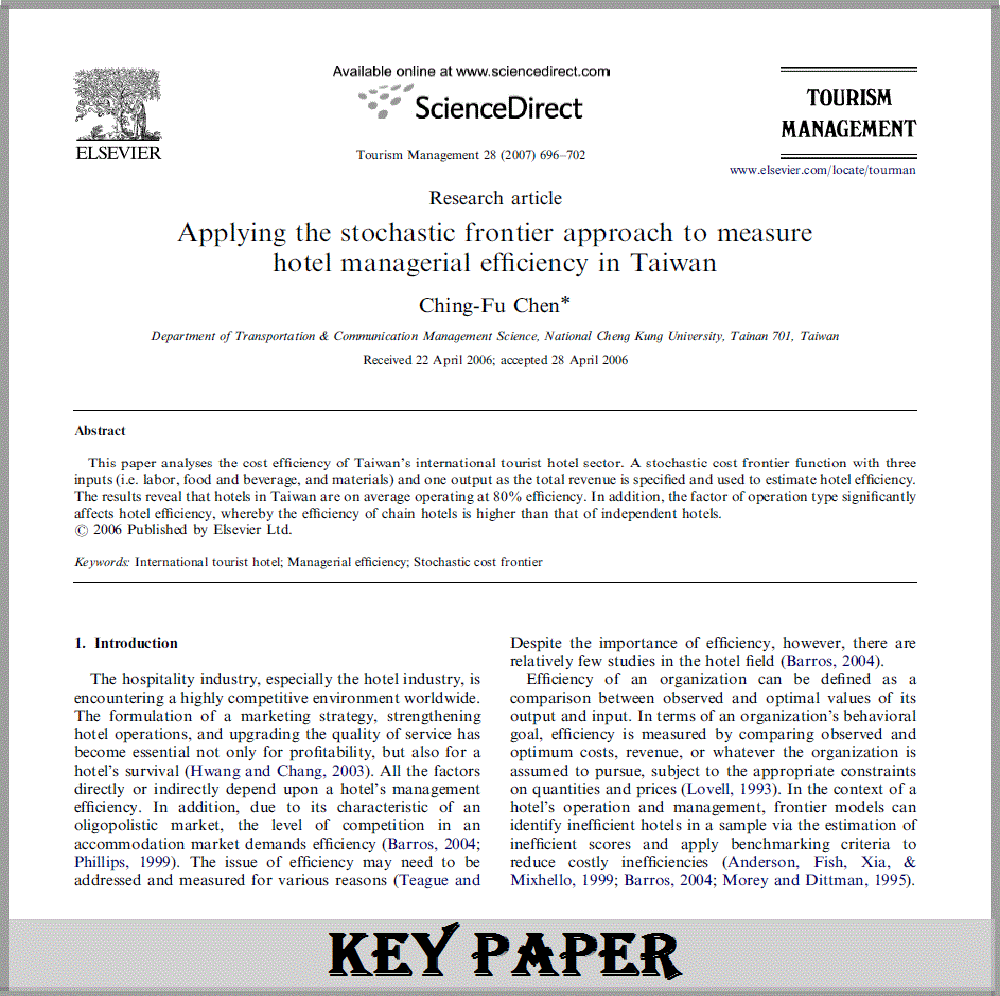
Applying the stochastic frontier approach to measure hotel managerial efficiency in Taiwan
Author: Ching-Fu Chen
Journal: Tourism Management
Published: 2007
Abstract: This paper analyses the cost efficiency of Taiwan’s international tourist hotel sector. A stochastic cost frontier function with three inputs (i.e. labor, food and beverage, and materials) and one output as the total revenue is specified and used to estimate hotel efficiency. The results reveal that hotels in Taiwan are on average operating at 80% efficiency. In addition, the factor of operation type significantly affects hotel efficiency, whereby the efficiency of chain hotels is higher than that of independent hotels.
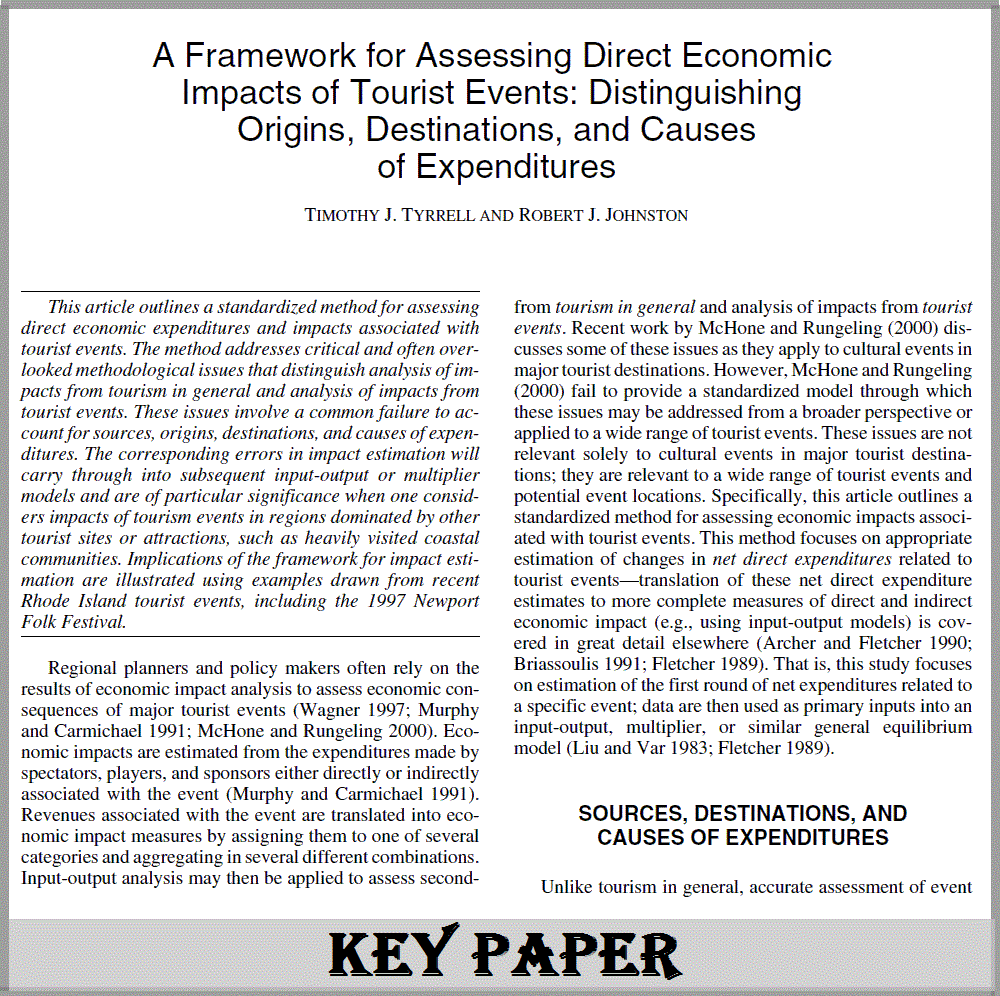
A Framework for Assessing Direct Economic Impacts of Tourist Events: Distinguishing Origins, Destinations, and Causes of Expenditures
Authors: TIMOTHY J. TYRRELL AND ROBERT J. JOHNSTON
Journal: Journal of Travel Research
Published: 2001
Abstract: This article outlines a standardized method for assessing direct economic expenditures and impacts associated with tourist events. The method addresses critical and often overlooked methodological issues that distinguish analysis of impacts from tourism in general and analysis of impacts from tourist events. These issues involve a common failure to account for sources, origins, destinations, and causes of expenditures.The corresponding errors in impact estimation will carry through into subsequent input-output or multiplier models and are of particular significance when one considers impacts of tourism events in regions dominated by other tourist sites or attractions, such as heavily visited coastal communities. Implications of the framework for impact estimation are illustrated using examples drawn from recent Rhode Island tourist events, including the 1997 Newport Folk Festival.
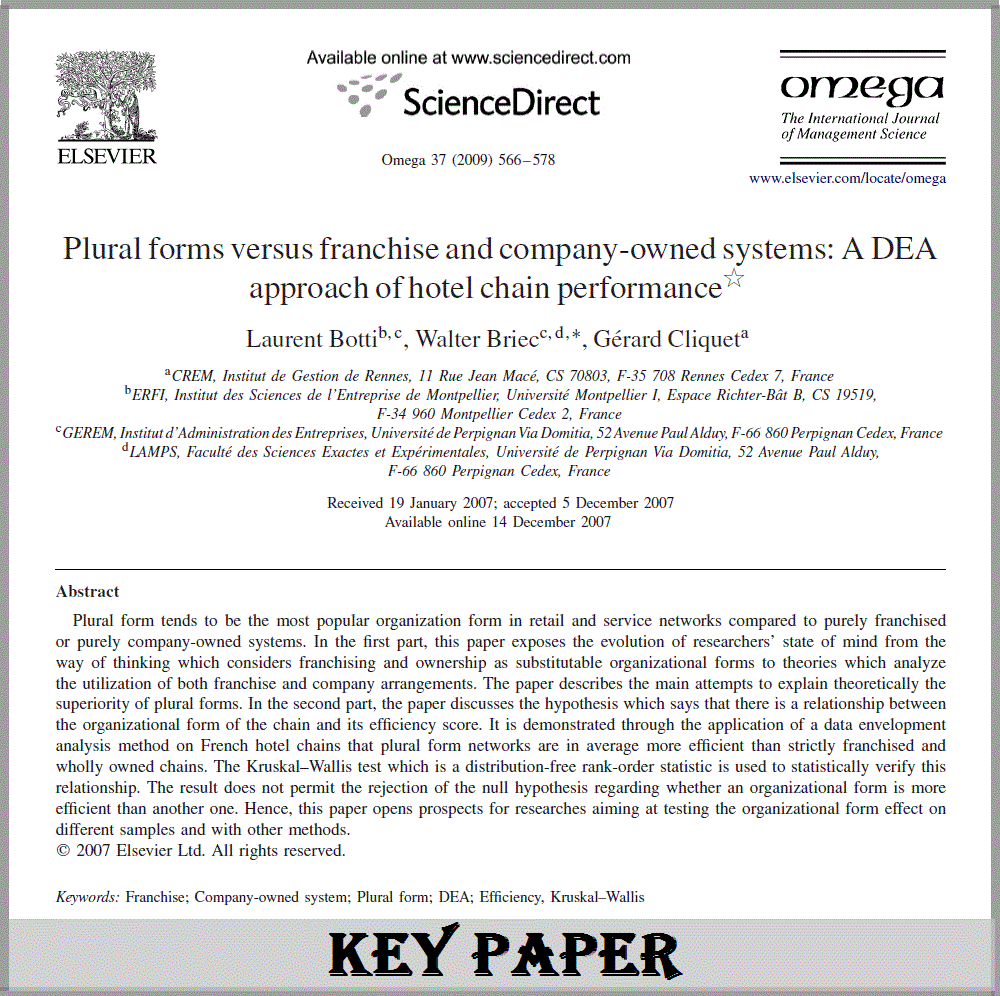
Plural forms versus franchise and company-owned systems:ADEA approach of hotel chain performance
Authors: Laurent Botti, Walter Briec, Gérard Cliquet
Journal: Omega
Published: 2009
Abstract: Plural form tends to be the most popular organization form in retail and service networks compared to purely franchised or purely company-owned systems. In the first part, this paper exposes the evolution of researchers’ state of mind from the way of thinking which considers franchising and ownership as substitutable organizational forms to theories which analyze the utilization of both franchise and company arrangements. The paper describes the main attempts to explain theoretically the superiority of plural forms. In the second part, the paper discusses the hypothesis which says that there is a relationship between the organizational form of the chain and its efficiency score. It is demonstrated through the application of a data envelopment analysis method on French hotel chains that plural form networks are in average more efficient than strictly franchised and wholly owned chains. The Kruskal–Wallis test which is a distribution-free rank-order statistic is used to statistically verify this relationship. The result does not permit the rejection of the null hypothesis regarding whether an organizational form is more efficient than another one. Hence, this paper opens prospects for researches aiming at testing the organizational form effect on different samples and with other methods.
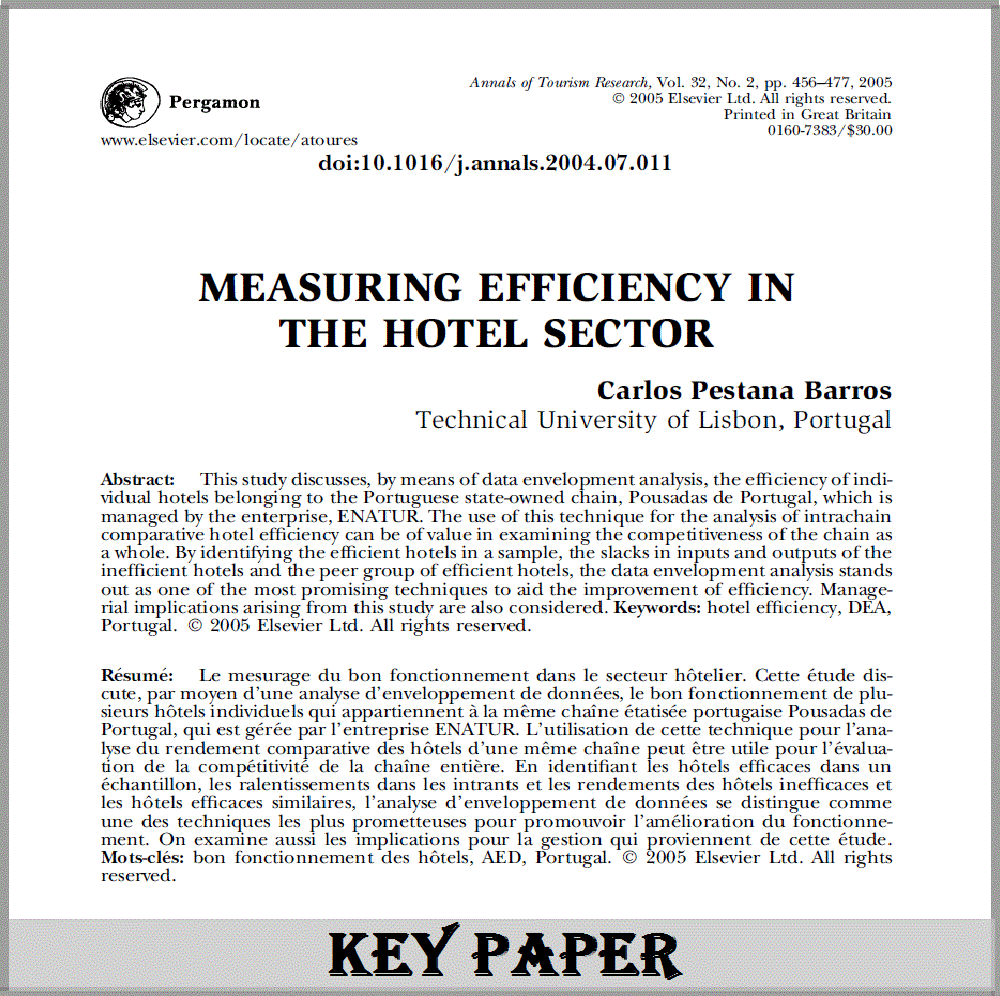
MEASURING EFFICIENCY IN THE HOTEL SECTOR
Author: Carlos Pestana Barros
Journal: Annals of Tourism Research
Published: 2004
Abstract: This study discusses, by means of data envelopment analysis, the efficiency of individual hotels belonging to the Portuguese state-owned chain, Pousadas de Portugal, which is managed by the enterprise, ENATUR. The use of this technique for the analysis of intrachain comparative hotel efficiency can be of value in examining the competitiveness of the chain as a whole. By identifying the efficient hotels in a sample, the slacks in inputs and outputs of the inefficient hotels and the peer group of efficient hotels, the data envelopment analysis stands out as one of the most promising techniques to aid the improvement of efficiency. Managerial implications arising from this study are also considered.
NEW INTERESTING PAPERS
The using of the DEA technique in the tourism sector is increasing over time. This section introduces new articles that present a new method or significant results in this area.
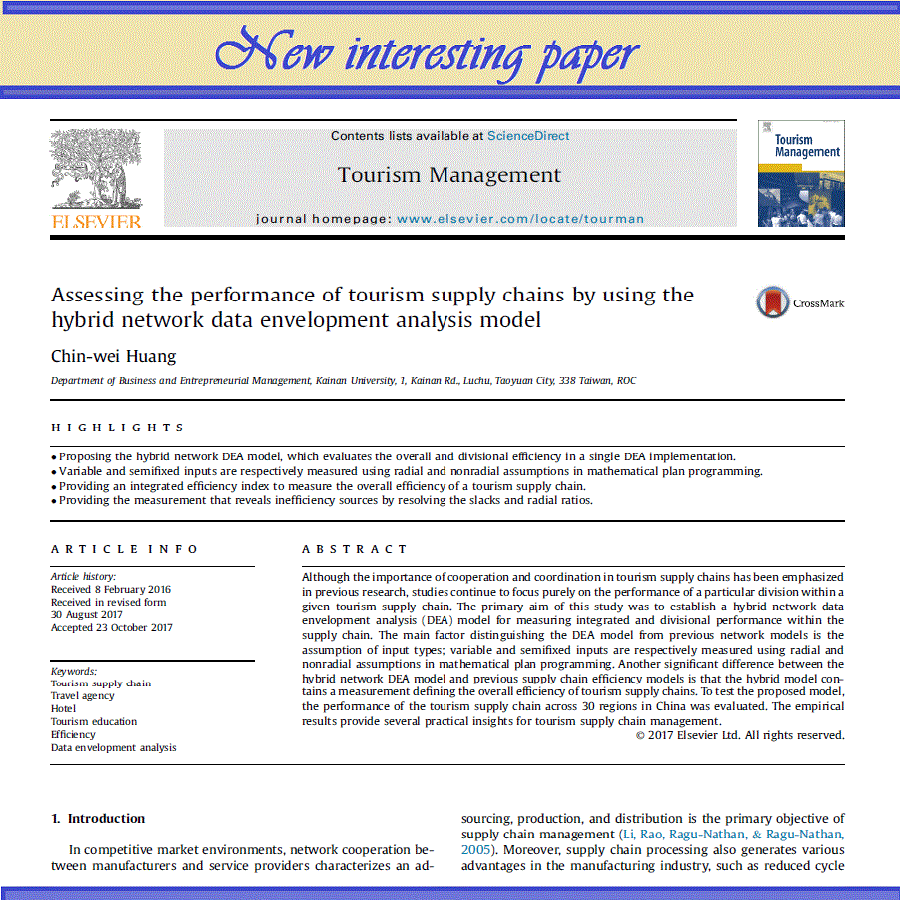
Assessing the performance of tourism supply chains by using the hybrid network data envelopment analysis model
Author: Chin-wei Huang
Journal: Tourism Management
Published: April 2018
Abstract: Although the importance of cooperation and coordination in tourism supply chains has been emphasized in previous research, studies continue to focus purely on the performance of a particular division within a given tourism supply chain. The primary aim of this study was to establish a hybrid network data envelopment analysis (DEA) model for measuring integrated and divisional performance within the supply chain. The main factor distinguishing the DEA model from previous network models is the assumption of input types; variable and semifixed inputs are respectively measured using radial and nonradial assumptions in mathematical plan programming. Another significant difference between the hybrid network DEA model and previous supply chain efficiency models is that the hybrid model contains a measurement defining the overall efficiency of tourism supply chains. To test the proposed model, the performance of the tourism supply chain across 30 regions in China was evaluated. The empirical results provide several practical insights for tourism supply chain management.
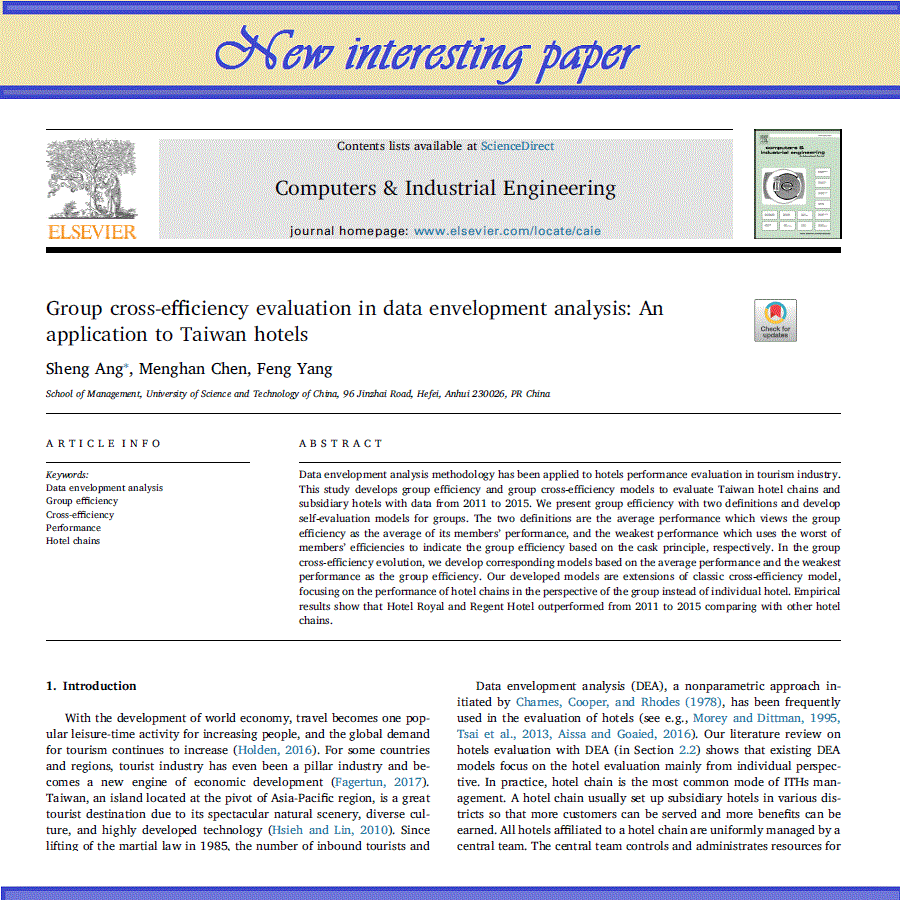
Group cross-efficiency evaluation in data envelopment analysis: An application to Taiwan hotels
Authors: Author: Sheng Ang , Menghan Chen, Feng Yang
Journal: Computers & Industrial Engineering
Published: November 2018
Abstract: Data envelopment analysis methodology has been applied to hotels performance evaluation in tourism industry. This study develops group efficiency and group cross-efficiency models to evaluate Taiwan hotel chains and subsidiary hotels with data from 2011 to 2015. We present group efficiency with two definitions and develop self-evaluation models for groups. The two definitions are the average performance which views the group efficiency as the average of its members’ performance, and the weakest performance which uses the worst of members’ efficiencies to indicate the group efficiency based on the cask principle, respectively. In the group cross-efficiency evolution, we develop corresponding models based on the average performance and the weakest performance as the group efficiency. Our developed models are extensions of classic cross-efficiency model, focusing on the performance of hotel chains in the perspective of the group instead of individual hotel. Empirical results show that Hotel Royal and Regent Hotel outperformed from 2011 to 2015 comparing with other hotel chains.
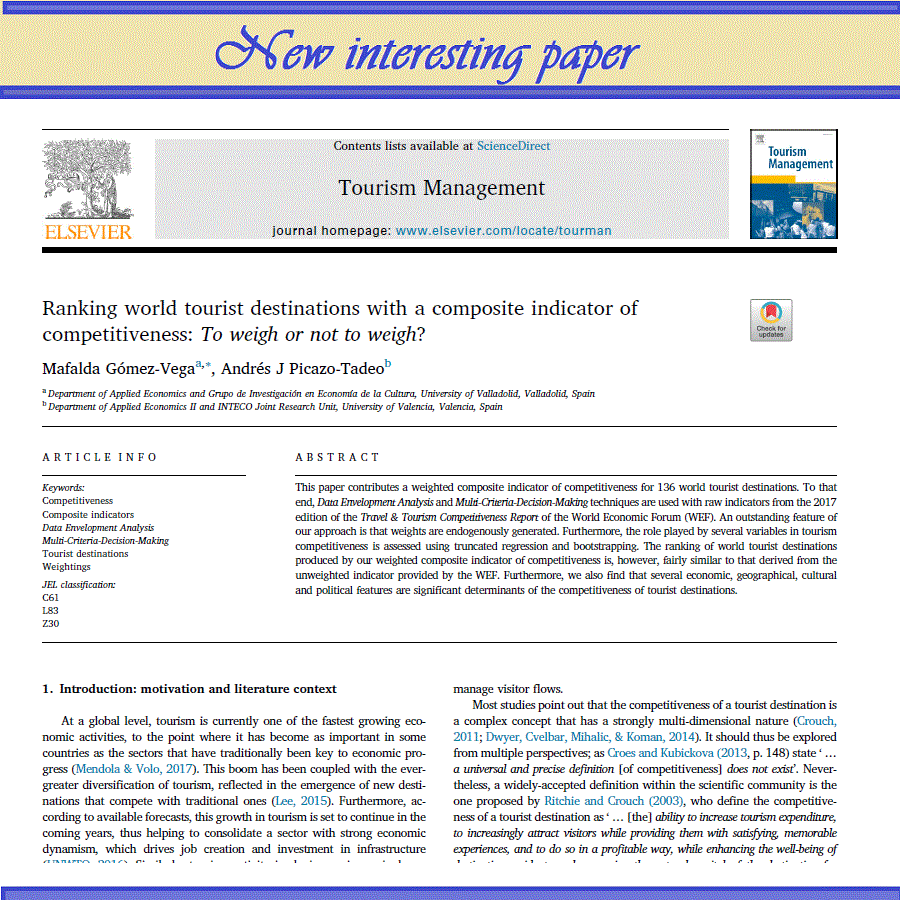
Ranking world tourist destinations with a composite indicator of competitiveness: To weigh or not to weigh?
Authors: Mafalda Gómez-Vega, Andrés J Picazo-Tadeo
Journal: Tourism Management
Published: 2019
Abstract: This paper contributes a weighted composite indicator of competitiveness for 136 world tourist destinations. To that end, Data Envelopment Analysis and Multi-Criteria-Decision-Making techniques are used with raw indicators from the 2017 edition of the Travel & Tourism Competitiveness Report of the World Economic Forum (WEF). An outstanding feature of our approach is that weights are endogenously generated. Furthermore, the role played by several variables in tourism competitiveness is assessed using truncated regression and bootstrapping. The ranking of world tourist destinations produced by our weighted composite indicator of competitiveness is, however, fairly similar to that derived from the unweighted indicator provided by the WEF. Furthermore, we also find that several economic, geographical, cultural and political features are significant determinants of the competitiveness of tourist destinations.
RELATED SUBJECT
STATISTICS
In this section, we list a series of selected descriptive statistics involving the numbers and distributions of papers, journals and keywords of DEA and Tourism related articles.
1. Statistics involving publications by year
The following chart shows the distribution of DEA banking articles published by year. The greatest number of articles is in 2018. It shows that the using of DEA technique in the tourism sector is increasing.
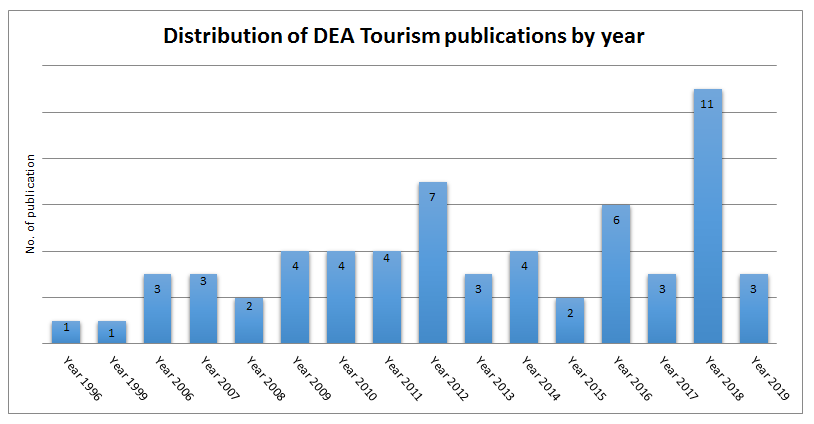
2. Statistics involving publications by journal
The following chart shows ten journals that have published the greatest number of DEA tourism papers in the past years. Journals such as Tourism Management and International Journal of Hospitality Management are the most utilized.

3. Statistics involving keywords used
The following table lists the most popular keywords by number of publications.
REFERENCES
61. Ranking world tourist destinations with a composite indicator of competitiveness: To weigh or not to weigh?
Mafalda Gómez-Vega, Andrés J Picazo-Tadeo
Tourism Management, Volume 72, Pages 281-291
June 2019
Keywords:
60. Do environmentally sustainable practices make hotels more efficient? A study of major hotels in Sri Lanka
Thamarasi Kularatne, Clevo Wilson, Jonas Månsson, Vincent Hoang, Boon Lee
Tourism Management, Volume 71, Pages 213-225
April 2019
Keywords:
59. The impact of tourist destination on hotel efficiency: A data envelopment analysis approach
Rubén Lado-Sestayo, Ángel Santiago Fernández-Castro
European Journal of Operational Research, Volume 272, Issue 2, Pages 674-686
16 January 2019
Keywords:
58. Testing general and special Färe-Primont indices: A proposal for public and private sector synthetic indices of European regional expenditures and tourism
Walter Briec, Kristiaan Kerstens, Diego Prior, Ignace Van de Woestyne
European Journal of Operational Research, Volume 271, Issue 2, Pages 756-768
1 December 2018
Keywords:
57. Group cross-efficiency evaluation in data envelopment analysis: An application to Taiwan hotels
Sheng Ang, Menghan Chen, Feng Yang
Computers & Industrial Engineering, Volume 125, Pages 190-199
November 2018
Keywords:
56. Intellectual structure of strategic management research in the hospitality management field: A co-citation analysis
Mehmet Ali Köseoglu, Fevzi Okumus, Ismail Cagri Dogan, Rob Law
International Journal of Hospitality Management
In press, corrected proof
Available online 27 September 2018
Keywords:
55. Analyzing hotel efficiency from a regional perspective: The role of environmental determinants
Ricardo Sellers-Rubio, Ana B. Casado-Díaz
International Journal of Hospitality Management, Volume 75, Pages 75-85
September 2018
Keywords:
54. A round trip on decentralization in the tourism sector
Calogero Guccio, Isidoro Mazza, Anna Mignosa, Ilde Rizzo
Annals of Tourism Research, Volume 72, Pages 140-155
September 2018
Keywords:
53. How can managerial efficiency be improved? Evidence from the bed and breakfast industry
Chia-Ning Chiu
Tourism Management Perspectives, Volume 27, Pages 111-124
July 2018
Keywords:
52. The efficiency of the public intervention on the environment:Evidence based on non-parametric and parametric approaches
Marta Meleddu, Manuela Pulina
Journal of Cleaner Production, Volume 183, Pages 744-759
10 May 2018
Keywords:
51. Assessing the performance of tourism supply chains by using the hybrid network data envelopment analysis model
Chin-wei Huang
Tourism Management, Volume 65, Pages 303-316
April 2018
Keywords:
50. China's regional tourism efficiency: A two-stage double bootstrap data envelopment analysis
Sami Chaabouni
Journal of Destination Marketing & Management
In press, corrected proof
Available online 12 February 2018
Keywords:
49. Group cross-efficiency evaluation in data envelopment analysis: An application to Taiwan hotels
Sheng Ang, Menghan Chen, Feng Yang
Computers & Industrial Engineering, Volume 125, Pages 190-199
November 2018
Keywords:
48. Analyzing hotel efficiency from a regional perspective: The role of environmental determinants
Ricardo Sellers-Rubio, Ana B. Casado-Díaz
International Journal of Hospitality Management, Volume 75, Pages 75-85
September 2018
Keywords:
47. Tourism eco-efficiency of Chinese coastal cities – Analysis based on the DEA-Tobit model
Jia Liu, Junfei Zhang, Zhengben Fu
Ocean & Coastal Management, Volume 148, Pages 164-170
1 November 2017
Keywords:
46. Eco-efficiency and its determinants at a tourism destination: A case study of Huangshan National Park, China
Hongsong Peng, Jinhe Zhang, Lin Lu, Guorong Tang, Ya Han
Tourism Management, Volume 60, Pages 201-211
June 2017
Keywords:
45. Does partial privatisation improve performance? Evidence from a chain of hotels in Portugal
Carla A. F. Amado, Sérgio P. Santos, Jaime M. M. Serra
Journal of Business Research, Volume 73, Pages 9-19
April 2017
Keywords:
44. Performance evaluation of the hotel industry in an emerging tourism destination: The case of Oman
Amar Oukil, Nabil Channouf, Asma Al-Zaidi
Journal of Hospitality and Tourism Management, Volume 29, Pages 60-68
December 2016
Keywords:
43. Efficiency and productivity changes in Greek airports during the crisis years 2010–2014
Alexandra Fragoudaki, Dimitriοs Giokas, Kyriaki Glyptou
Journal of Air Transport Management, Volume 57, Pages 306-315
October 2016
Keywords:
42. A three-stage DEA model to evaluate learning-teaching technical efficiency: Key performance indicators and contextual variables
Ramón Fuentes, Begoña Fuster, Adelaida Lillo-Bañuls
Expert Systems with Applications, Volume 48, Pages 89-99
15 April 2016
Keywords:
41. Airport performance in a tourism receiving country: Evidence from Greece
Alexandra Fragoudaki, Dimitris Giokas
Journal of Air Transport Management, Volume 52, Pages 80-89
April 2016
Keywords:
40. The effects of UNESCO World Heritage List inscription on tourism destinations performance in Italian regions
Tiziana Cuccia, Calogero Guccio, Ilde Rizzo
Economic Modelling, Volume 53, Pages 494-508
February 2016
Keywords:
39. Linking operations, marketing and environmental capabilities and diversification to hotel performance: A data envelopment analysis approach
Ramakrishnan Ramanathan, Usha Ramanathan, Yubo Zhang
International Journal of Production Economics, Volume 176, Pages 111-122
June 2016
Keywords:
38. Measuring the efficiency of trade shows: A Spanish case study
Pilar Alberca-Oliver, Ainhoa Rodríguez-Oromendía, Laura Parte-Esteban
Tourism Management, Volume 47, Pages 127-137
April 2015
Keywords:
37. Obtaining the Efficiency of Tourism Destination Website Based on Data Envelopment Analysis
Aurkene Alzua-Sorzabal, Mikel Zurutuza, Fidel Rebón, Jon Kepa Gerrikagoitia
Procedia - Social and Behavioral Sciences, Volume 175, Pages 58-65
12 February 2015
Keywords:
36. Technical efficiency and environmental management: The Tunisian case
Salem Hathroubi, Nicolas Peypoch, Elisabeth Robinot
Journal of Hospitality and Tourism Management, Volume 21, Pages 27-33
December 2014
Keywords:
35. Rural areas face the economic crisis: Analyzing the determinants of successful territorial dynamics
Pedro Sánchez-Zamora, Rosa Gallardo-Cobos, Felisa Ceña-Delgado
Journal of Rural Studies, Volume 35, Pages 11-25
July 2014
Keywords:
34. Tourism and transport systems in mountain environments: analysis of the economic efficiency of cableways in South Tyrol
Juan Gabriel Brida, Manuela Deidda, Manuela Pulina
Journal of Transport Geography, Volume 36, Pages 1-11
April 2014
Keywords:
33. Measurement of tourist hotels׳ productive efficiency, occupancy, and catering service effectiveness using a modified two-stage DEA model in Taiwan
Chin-wei Huang, Foo Nin Ho, Yung-ho Chiu
Omega, Volume 48, Pages 49-59
October 2014
Keywords:
32. Composite indicator for the assessment of sustainability: The case of Cuban nature-based tourism destinations
Víctor Pérez, Flor Guerrero, Mercedes González, Fátima Pérez, Rafael Caballero
Ecological Indicators, Volume 29, Pages 316-324
June 2013
Keywords:
31. Efficiency and its determinants in Portuguese hotels in the Algarve
Ricardo Oliveira, Maria Isabel Pedro, Rui Cunha Marques
Tourism Management, Volume 36, Pages 641-649
June 2013
Keywords:
30. Investigation and analysis on the energy consumption of starred hotel buildings in Hainan Province, the tropical region of China
Shilei Lu, Shasha Wei, Ke Zhang, Xiangfei Kong, Wei Wu
Energy Conversion and Management, Volume 75, Pages 570-580
November 2013
Keywords:
29. Energy benchmarking in support of low carbon hotels: Developments, challenges, and approaches in China
Wilco Chan
International Journal of Hospitality Management, Volume 31, Issue 4, Pages 1130-1142
December 2012
Keywords:
28. Benchmarking the Asia Pacific tourism industry: A Bayesian combination of DEA and stochastic frontier
A. George Assaf
Tourism Management, Volume 33, Issue 5, Pages 1122-1127
October 2012
Keywords:
27. Critiquing the World Economic Forum's concept of destination competitiveness: A further analysis
Wei-Wen Wu, Lawrence W. Lan, Yu-Ting Lee
Tourism Management Perspectives, Volume 4, Pages 198-206
October 2012
Keywords:
26. Two-stage performance model for evaluating the managerial efficiency of higher education: Application by the Taiwanese tourism and leisure department
Te-Yi Chang, Pi-Heng Chung, Shiuh-Sheng Hsu
Journal of Hospitality, Leisure, Sport & Tourism Education, Volume 11, Issue 2, Pages 168-177
July 2012
Keywords:
25. Energy benchmarking in support of low carbon hotels: Developments, challenges, and approaches in China
Wilco Chan
International Journal of Hospitality Management, Volume 31, Issue 4, Pages 1130-1142
December 2012
Keywords:
24. Does Triple Bottom Line reporting improve hotel performance?
A. George Assaf, Alexander Josiassen, Ljubica Knežević Cvelbar
International Journal of Hospitality Management, Volume 31, Issue 2, Pages 596-600
June 2012
Keywords:
23. Dynamic efficiency assessment of the Chinese hotel industry
Yinghua Huang, Hani I. Mesak, Maxwell K. Hsu, Hailin Qu
Journal of Business Research, Volume 65, Issue 1, Pages 59-67
January 2012
Keywords:
22. Beyond Travel & Tourism competitiveness ranking using DEA, GST, ANN and Borda count
Wei-Wen Wu
Expert Systems with Applications, Volume 38, Issue 10, Pages 12974-12982
15 September 2011
Keywords:
21. Determinants of efficiency in the provision of municipal street-cleaning and refuse collection services
Bernardino Benito-López, María del Rocio Moreno-Enguix, José Solana-Ibañez
Waste Management, Volume 31, Issue 6, Pages 1099-1108
June 2011
Keywords:
20. Performance of French destinations: Tourism attraction perspectives
Carlos Pestana Barros, Laurent Botti, Nicolas Peypoch, Elisabeth Robinot, George Assaf A.
Tourism Management, Volume 32, Issue 1, Pages 141-146
February 2011
Keywords:
19. Evaluating the influence of E-marketing on hotel performance by DEA and grey entropy
Jia-Jane Shuai, Wei-Wen Wu
Expert Systems with Applications, Volume 38, Issue 7, Pages 8763-8769
July 2011
Keywords:
18. Improved slack-based context-dependent DEA – A study of international tourist hotels in Taiwan
Hilary Cheng, Yi-Chuan Lu, Jen-Tsung Chung
Expert Systems with Applications, Volume 37, Issue 9, Pages 6452-6458
September 2010
Keywords:
17. Hotel efficiency: A bootstrapped metafrontier approach
A. Assaf, C. P. Barros, A. Josiassen
International Journal of Hospitality Management, Volume 29, Issue 3, Pages 468-475
September 2010
Keywords:
16. An investigation into the relationship between size and efficiency of the Italian hospitality sector: A window DEA approach
Manuela Pulina, Claudio Detotto, Antonello Paba
European Journal of Operational Research, Volume 204, Issue 3, Pages 613-620
1 August 2010
Keywords:
15. A performance evaluation model for international tourist hotels in Taiwan—An application of the relational network DEA
Ling-Feng Hsieh, Li-Hung Lin
International Journal of Hospitality Management, Volume 29, Issue 1, Pages 14-24
March 2010
Keywords:
14. Chinese national parks: Differences, resource use and tourism product portfolios
Xiao-Long Ma, Chris Ryan, Ji-Gang Bao
Tourism Management, Volume 30, Issue 1, Pages 21-30
February 2009
Keywords:
13. Performance measurement of an enterprise and business units with an application to a Taiwanese hotel chain
Tien-Hui Chen
International Journal of Hospitality Management, Volume 28, Issue 3, Pages 415-422
September 2009
Keywords:
12. Plural form chain and efficiency: Insights from the French hotel chains and the DEA methodology
Rozenn Perrigot, Gérard Cliquet, Isabelle Piot-Lepetit
European Management Journal, Volume 27, Issue 4, Pages 268-280
August 2009
Keywords:
11. Plural forms versus franchise and company-owned systems: A DEA approach of hotel chain performance
Laurent Botti, Walter Briec, Gérard Cliquet
Omega, Volume 37, Issue 3, Pages 566-578
June 2009
Keywords:
10. The geographical efficiency of Spain's regional airports: A quantitative analysis
Francisco J. Tapiador, Ana Mateos, Jordi Martí-Henneberg
Journal of Air Transport Management, Volume 14, Issue 4, Pages 205-212
July 2008
Keywords:
9. Technical efficiency of African hotels
Carlos Pestana Barros, Peter U. C. Dieke
International Journal of Hospitality Management, Volume 27, Issue 3, Pages 438-447
September 2008
Keywords:
8. Efficiency evaluation of A-group travel agencies with data envelopment analysis (DEA): A case study in the Antalya region, Turkey
Can Deniz Köksal, A. Akin Aksu
Tourism Management, Volume 28, Issue 3, Pages 830-834
June 2007
Keywords:
7. Improving resource utilization in multi-unit networked organizations: The case of a Spanish restaurant chain
Víctor M. Giménez-García, José Luis Martínez-Parra, Frank P. Buffa
Tourism Management, Volume 28, Issue 1, Pages 262-270
February 2007
Keywords:
6. Market orientation and performance in the service industry: A data envelopment analysis
Sven A. Haugland, Ingunn Myrtveit, Arne Nygaard
Journal of Business Research, Volume 60, Issue 11, Pages 1191-1197
November 2007
Keywords:
5. Energy efficiency assessment for the Antalya Region hotels in Turkey
Semih Önüt, Selin Soner
Energy and Buildings, Volume 38, Issue 8, Pages 964-971
August 2006
Keywords:
4. Efficiency, effectiveness and productivity of marketing in services
Hean Tat Keh, Singfat Chu, Jiye Xu
European Journal of Operational Research, Volume 170, Issue 1, Pages 265-276
1 April 2006
Keywords:
3. Energy efficiency assessment for the Antalya Region hotels in Turkey
Semih Önüt, Selin Soner
Energy and Buildings, Volume 38, Issue 8, Pages 964-971
August 2006
Keywords:
2. Measuring efficiency in the hotel industry: A stochastic frontier approach
Randy I. Anderson, Mary Fish, Yi Xia, Frank Michello
International Journal of Hospitality Management, Volume 18, Issue 1, Pages 45-57
March 1999
Keywords:
1. Measuring the performance of hotel operations
Celik Parkan
Socio-Economic Planning Sciences, Volume 30, Issue 4, Pages 257-292
December 1996
Keywords: